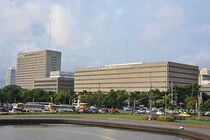National Bank of Orioni
| |||
| Headquarters | O'polis, Orioni | ||
|---|---|---|---|
| Established | March 1, 1939 | ||
| Governor | Mrs Minyoti Pironi | ||
| Central bank of | Orioni | ||
| Currency | Orinese Phi ORP (ISO 4217) | ||
| Reserves | Φ162 billion | ||
| Bank rate | 5.00% | ||
| Website | www | ||
The National Bank of Orioni (Oharic: Baniki Biherawi Erwaniya), abbreviated as NBO, has been central bank of Orioni since 1939.
History
Establishment
The 1924 economic crisis prompted the government to establish supervision over all private banks. Previously, the nation's monetary policy was administered by the Council of the Treasury. By 1934 a group of Orinese academics proposed the concept of establishing a central bank. The Sibiseba discussed the benefits of promoting price stability and economic growth. The ruling coalition government agreed to a five-year plan for the creation of a charter. It was submitted to the Sibiseba in February 1939 and made into law that same month. On March 1, 1939, the National Bank of the Orioni was formally inaugurated by Empress Owa, with Mrs Jurjina Yasna as the first governor. Its principal functions and responsibilities at the time were the preservation of monetary confidence and the improvement of economic growth.
Modernisation
Over the years, changes were added to make the charter correspond to economic requirements. In November 1974, following the disturbing Second Argic War (1968-1974), Governor Robert Wefochi amended the charter to contain rules for international monetary stability. The Bank's authority was also expanded to include regulation of the entire Orinese financial system, not just oversee the banking system.
Anti-money laundering
The criminal practice of money laundering is a persisting problem in Orioni and the wider Orient. The NBO has announced many preventive and counteractive measures to overcome the illegal processes. In January 2009, the Anti-Money Laundering Act was made into law. It provides a foundation of the monitoring, blocking and penalising suspected and conviction of money laundering operations. In January 2011, Chairman Ionas Strupar further strengthened the Anti-Money Laundering Law. He expanded its responsibilities to include: suspicious transactions in foreign exchange, real estate, art, precious metals and jewellery.
Hacking
On the evening of November 28, 2014, a Friday, the NBO website was hacked by a group named Black Hat in a protest against the Strupar government. The website wasn't restored until the early hours of Monday morning of the next week. The following weeks, a set of confidential electronic documents were released describing tax evasion and shell corporations used for illegal purpose in Rohini. The documents indirectly contributed to the ousting of Chairman Ionas Strupar and the reelection of Chairlady Chandra Pristo in 2015.
Functions
Apart from monetary policy, the National Bank of Orioni carries out these following functions:
- issuing and printing of Phi banknotes;
- placing in circulation of Phi coins;
- services to the Orinese financial sector;
- services to the public;
- management of foreign currency reserves;
- collection, circulation, and analysis of economic and financial information.
Organisation
Governors
The Governor of the National Bank is a member of the Sibiseba, the legislative body of Orioni. The following is a list of the Governors of the National Bank of Orioni since its foundation in the 20th century.
- Mrs Jurjina Yasna (1939–1941)
- Mr Ali Gobiri (1941)
- Mrs Jina Anisi (1941–1944)
- Mrs Wendimi Morsi (1944–1957)
- Mrs Abriti Anshixu (1957–1971)
- Mr Robert Wefochi (1971–1975)
- Mrs Sisili Distari (1975–1982)
- Mrs Rani Melekotawi (1982–1989)
- Mrs Lanika Esakesi (1989–1999)
- Mrs Loka Manda (1999–2011)
- Mr Lukasi Daperi (2011–2015)
- Mrs Jeni Simizi (2015–2019)
- Mrs Minyoti Pironi (2019 – Present)


